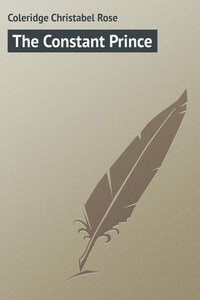Prologue
In 1785
“That the character of the inhabitants of any country has much to do in forming a distinct devil for that country no man can doubt.”
From “John Inglesant.”
At ten o’clock at night on the 4th of October, 1785, the master of Waynflete Hall sat playing at cards with Mr Maxwell of Ouseley, his neighbour and his enemy. By the fireside sat Waynflete’s brother, the parson of the parish, and over the chimney, in the light of the candle’s on the card-table, was the picture of his eldest son and heir. The squire and the vicar were big, powerful men, with fair, bushy brows, and faces that told of rough riding and coarse living, hard weather and hard drinking, the only mark of their gentle blood that frank expectation of deference and service which marks a ruling class. The keener, thinner face of their visitor had the opposite look, that of a man accustomed to defer, and perhaps to flatter, for his livelihood. The face of the boy in the picture was fair and delicate, with eyes that seemed pleading and entreating for dear life.
Outside, all was dark and dreary, a wild autumn wind sweeping over the wide Yorkshire moors, and a noisy river, swelled by recent floods, rushing through the valley in which Waynflete stood. Within, the candles and the fire were reflected in panels of polished oak all round the little octagon-shaped chamber, and showed choice furniture with slender spindle legs and fine inlaying. The common mould candles burnt in heavy silver candlesticks of Corinthian pattern, and the many-times used cards lay on a pattern of thick twining roses worked in finest tent-stitch.
On a little side table was placed a shabby leather case, and a small oak chest with iron hasps and hinges. On another, within easy reach of the card-players, was a plentiful supply of port wine and of spirits.
Now and again, when the tall clock in the corner struck a quarter or a half-hour, the vicar got up and, opening one of the deep-recessed windows, stared out into the night. Then he flung the casement back again in silence, came back to his chair, and he and his brother filled their glasses full and drank them down. But Mr Maxwell of Ouseley only set his lips to his. At last eleven strokes, quick, sharp, and loud, rang out from the clock in the corner. The squire flung his cards down, and the parson swore a round oath.
“Time gets on,” said Maxwell of Ouseley. “I hope Mr Guy’s journey has not been unduly delayed. I hope it sincerely.”
“Do you, Mr Maxwell of Ouseley?” said the squire. “Your hope’s very likely to be disappointed, for my son Guy never fulfilled anybody’s hopes in his life. Not his mother’s.”
And the squire looked round at the familiar furniture, dropped his rough hand on the delicate needlework, and looked with his frowning brows at the picture, the token of his dead wife’s love for her first-born son.
“Time yet, time yet,” said the parson, and got heavily up once more, and flung the window open. The wind rushed in, wailing and howling, and with it a sound as of a horse galloping on the wet ground.
“He is coming!” cried Maxwell; but the Waynfletes laughed.
“No, no, no!” cried the squire; “that horse never draws bridle. He has galloped ever since Guy Waynflete betrayed his friend to King James the Second, and saved his own dirty skin. Ye’ll hear him, Mr Maxwell, when you sleep under this roof when the wind’s up – and luck’s down. Maybe ye’ll see the traitor’s ghost. My son Guy has seen him – or else he lied, which is like enough. Shut the window, brother Godfrey, and snuff the candles.”
“Will you deal again, sir?” said Maxwell of Ouseley.
“No,” cried the squire; “cards won’t bring the lad back. Get your book, brother Godfrey, and read us a prayer. Pray, man, pray! and Mr Maxwell can join us.”
“With pleasure, sir,” said Maxwell of Ouseley, bowing.
“The prayer-book’s in the church, brother,” said the parson.
Then the squire got up and opened a drawer in the little side table, and took out a well-worn book with a red cover.
“There’s the mother’s book,” he said. “Read on. We’ll fight it out to the last.”
Then the parson of the parish turned his heavy chair round towards the light, and knelt up against the back of it, for his bones were something too stiff to reach the floor.
“What – what do you want to pray for, brother?” he said.
“What?” cried the squire with an oath, “that my fool of a son may get here before the clock strikes twelve, and save his honour and his house. Can’t you find a prayer? Read the first in the book. The Almighty’ll understand it.”
The squire leant his elbows on the card-table and his forehead on his hands. Mr Maxwell of Ouseley stood up decorously, and held his three-cornered hat before his face.
And the parson turned to the evening service, and read it straight through sonorously. The words implored pardon and peace, and light in darkness; but they carried but one prayer up to the throne of Heaven, “Let him come.”
Then the parson began the Litany till he came to the travellers by land and by water, when he rustled over the leaves of his book, and behold there was a mark in the prayer for those at sea, which did not run so ill in a storm of trouble and distress. “Save, Lord, or else we perish,” he said, and the squire groaned and said, “Amen.”












